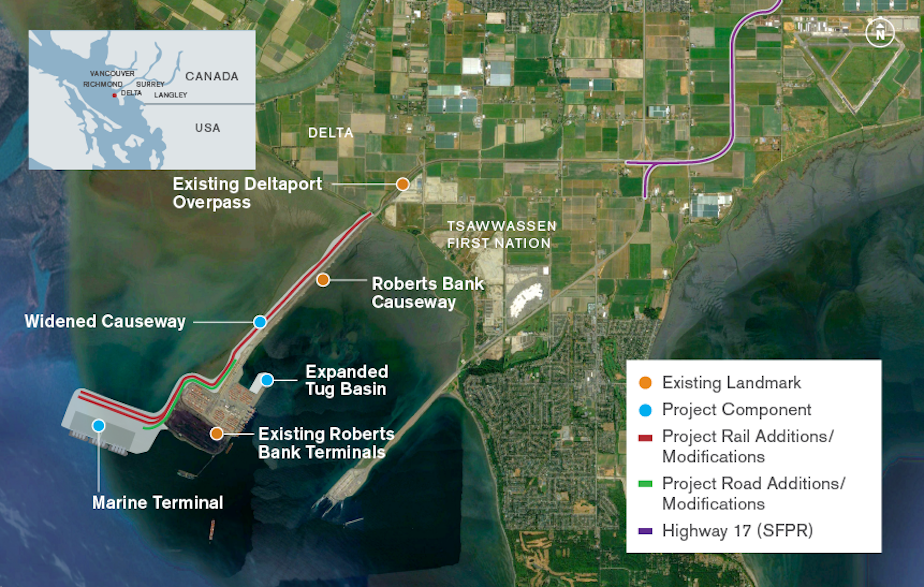Lummi Nation moves to block BC port expansion they say would impact salmon

The Port of Vancouver in British Columbia is planning an expansion that would increase Canada’s west coast container capacity by about a third.
Port officials say they have Indigenous buy-in on the Roberts Bank Terminal 2 Project. But officials with the Lummi Nation in Washington say they've been ignored in the process and they have filed a legal challenge to stop the port's expansion.
The sockeye salmon that run up the Fraser River are from a stock that the people of the Lummi Nation have fished since before contact with settlers.
Lummi Councilmember Lisa Wilson said the Fraser River sockeye are part of the identity and livelihood of her people.
Because of declining numbers of Fraser sockeye, Lummi members have only been able to fish for them once every four years. The potential increased ship traffic from an expanded port terminal in Vancouver would make that situation even worse, Wilson said.
The expansion project, which already has approval from the Canadian government, involves construction of a new three-berth marine container terminal just north of the Tsawassen Ferry Terminal.
“We already have hard enough issues with the BC ferry terminals running over our fishing nets,” Wilson said. “To create that huge vessel traffic is basically going to put us out of the only fishery that we have left up there."
Sponsored
The Treaty of Point Elliot recognizes the tribal rights to traditional fishing grounds in the U.S., but a lot of the work to uphold that treaty has been pushed onto the tribes, Wilson said.
The Lummi Nation has filed a legal challenge in Canadian courts to stop the port expansion just north of the U.S. border. The challenge is non-adversarial, which means there is no judge or jury.
“It is instead just a submission of a two-year-long record of repeated requests for deep and meaningful consultation with the government of British Columbia, and federal institutions that Canada has gone unmet and unanswered," said Gabe Cantu, a lawyer for the Lummi Nation.
In 2021, the Canadian government recognized what they call the Aboriginal rights of the Lakes Tribe of the Colville Confederated Tribes as pat of the R. v. Desautel court case. The Lummi Nation was part of that legal fight.
Lummi Chairman Anthony Hillaire said the Desautel decision also applies to people of the Lummi Nation, which has been consulted on infrastructure projects in British Columbia in the past. Hillaire argues that Lummi leaders should have been part of the conversation about the port expansion as well.
Sponsored
“Desautel confirmed that our rights were not extinguished by the border,” he said. “Yet, Canada continues to ignore us. The decision to approve the project without engaging in deep consultation with Lummi not only ignores Desautel, but also overlooks the opportunity we have to work together to restore salmon runs on the Fraser River.”
To get approval for the development of the maritime container terminal, the Port of Vancouver went through a Canadian regulatory process that also included signed agreements from 26 other Indigenous groups in the region.
“The port authority has collaborated with Indigenous groups on the project for more than a decade and now we look forward to working together to deliver economic, cultural, and environmental opportunities and initiatives,” said Judy Rodgers, who chairs the Port Authority Board.
Port officials say they intend to continue to coordinate and collaborate with Indigenous groups as the project progresses.
A spokesperson from the Port of Vancouver said they’ll be taking a look at the issues raised by the Lummi legal challenge. They said they were unable to comment further.
Sponsored
“We are currently reviewing the issues raised in the judicial review challenge of the federal government’s recent approval of the Roberts Bank Terminal 2 Project and will be responding in due course, in accordance with the federal rules of court," the spokesperson said.




